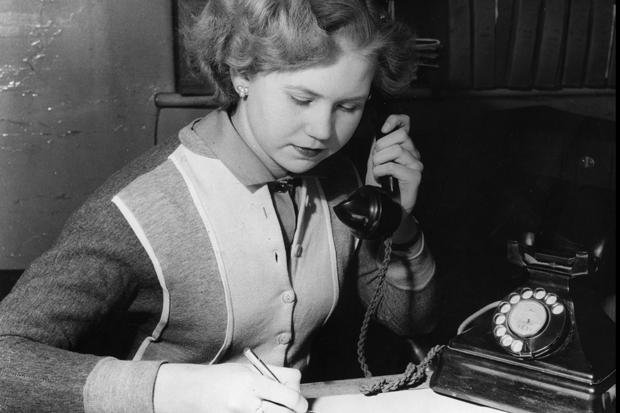‘Are all of these questions about politics love — because I’m really not political?’ Oh dear. I’ve just lost another respondent two minutes into a three-minute survey and the chances of achieving my hourly target, and therefore continuing my employment in pre-election polling, are receding fast.
Perhaps she didn’t hear my scripted preamble: ‘Could you spare a few minutes to take part in a survey on the upcoming general election?’ What sort of questions did she think I’d ask? ‘Do you think SamCam pulled off the midi-skirt?’
At least I can take pleasure in hearing a colleague struggle a few booths down. ‘No, not electrics madam, election.’ And then, a minute or so later — ‘No madam, nothing to do with electricity. I am not trying to sell you anything. Yes, I’m sure you are very satisfied with your current provider.’
Moments like this provide a little light relief from the monotony of a nine-hour shift in the airless, prefabricated building nestled on an industrial estate in one of Britain’s less salubrious commuter towns.
There are 200 or so MDF cubicles squeezed into the space, each with a computer screen and a telephone headset. After a cursory ‘afternoon’ of ‘training’ (a couple of hours devoted to privacy agreements and injunctions to ‘sound cheerful’), we are let loose on the beleaguered inhabitants of key marginals, who are already sick to death of politics. Incidentally, the phones ring automatically, without pause, endlessly. As soon as one call ends, another comes in.
There are large colourful posters tacked around the room featuring the smiling face, name and party of each of the leaders. ‘Mili-what? Never heard of ’im,’ proclaimed one fresh-faced school-leaver. And for those who have perhaps only recently arrived from distant climes, a further notice helpfully informed us which two parties currently ‘shared’ (as they put it) leading the country.
Hearing one young girl struggle repeatedly to pronounce ‘Farage’ in the course of delivering the scripted questionnaire, it seemed to me that our managers should have provided just a shade more instruction. I was quickly disabused of that notion when a management memo popped up in my inbox: ‘For those of you who don’t know, the DUP is the Democratic Unionist Party…. no, I had never heard of them either.’ (Exclamation, smiley face.)
There is a clear delineation of staff working on the poll. Some are young students, earning a bit of extra drinking money and with some degree of interest in the electoral process. They are unlikely to carry on cold-calling after the election and do not view it as a potential career path. The rest are shipped in from a plethora of local agencies. They don’t want to be here. They have no interest, nor, as I have mentioned, knowledge, but they have rent to pay and strings attached to their continued receipt of benefit payments.
It is not a pleasant job if you are not interested in the election. New arrivals on the receiving end of some particularly vitriolic tirade are frequently reduced to tears. Some walk out a few hours into their first shift. It’s a zero hours contract for an hourly rate barely topping the minimum wage. One closely monitored ten-minute break in six hours; smoke a fag — or eat? Sent home after three hours if your quota is filled. Remuneration for the shorter shifts barely covers the cost of getting there.
I am lucky. This is a short-term gig for me and I quickly became inured to the refusals: the dispiriting click of a receiver replaced, the general rudeness, being told to go to hell.
What if I fall short of my target? If I am ‘let go’ the bailiffs won’t come knocking. Others are not so fortunate. Obviously, our most frequent respondents are the elderly; they are the most likely to have a landline and to answer it, to be politically engaged, and to have the time to participate. Towards the end of every shift the upper age categories are closed and there is a mad scramble to get enough 18- to 44-year-olds and go home. I receive a group memo. ‘Those of you coding pensioners as 18–24. We know what you are doing. If they sound elderly when we listen in we will go back and check!’
After a shaky start, I have come to rather enjoy a job that has fostered a sort of grudging affection in me for the great British public. Some rejections are particularly inspired: ‘I’m not in today’ or ‘I’m too right-wing for your survey, I’d go so far as to say fascist.’ Some are heartbreakingly generous: ‘I’m so sorry, duck. I’d love to talk to you, but I’m just back from hospital after suffering a stroke. Chin up — you’re doing a great job.’
I’ve also learned a thing or two. Who knew, for instance, that there were more than half a dozen Liberal Democrat voters still in existence?
Oh, and a final word to the wise. If you simply hang up instead of taking a few seconds to make clear that you are not interested — you cannot be coded as ‘refusal’ and you will, I’m afraid, be called back: ‘Good afternoon, sir! We are calling people in your area….’
Got something to add? Join the discussion and comment below.
Get 10 issues for just $10
Subscribe to The Spectator Australia today for the next 10 magazine issues, plus full online access, for just $10.
You might disagree with half of it, but you’ll enjoy reading all of it. Try your first month for free, then just $2 a week for the remainder of your first year.














Comments
Don't miss out
Join the conversation with other Spectator Australia readers. Subscribe to leave a comment.
SUBSCRIBEAlready a subscriber? Log in